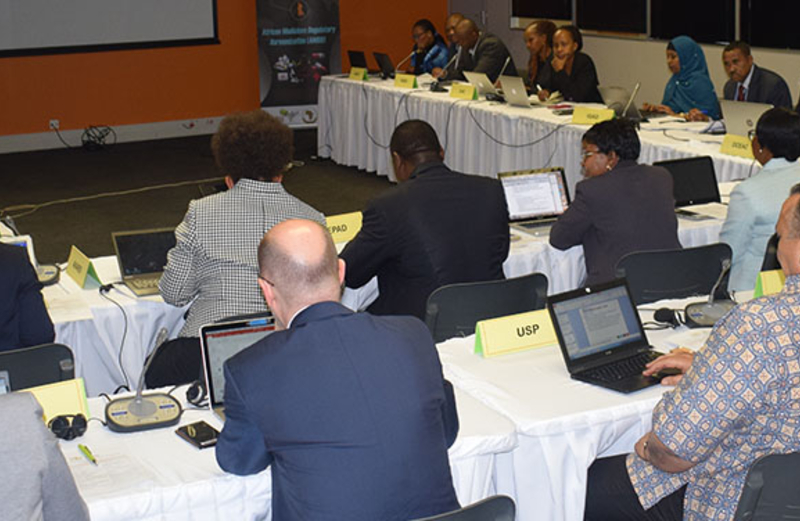New AMRH Governance Framework endorsed at 2nd Steering Committee meeting

The newly revised governance framework of the African Medicines Regulatory Harmonization (AMRH) program was endorsed at the 2nd Steering Committee (SC) on Regulatory Systems Strengthening and Harmonization Initiatives in Africa. The 2018 work plan and quarter one progress report of the AMRH program were also presented to the SC members for feedback and comments. The 2nd SC meeting took place in Johannesburg, South Africa at the NEPAD Agency Head Office from 12 – 13 April 2018. After the meeting, the necessary documents will be finalized to align with the comments and feedback received from SC members.
During the opening of the meeting, the Interim Chair of the SC Prof. Moji Christianah Adeyeye mentioned that the foundation of this meeting is to realize the vision of the AMRH in Africa and that is to ensure that African people have access to essential, quality, safe and efficacious medical products and technologies.
“As the Steering Committee, our mandate is to provide the strategic direction to ensure that the AMRH vision in Africa is achieved”, Prof. Adeyeye said.
Head of Industrialization, Science, Technology and Innovation (ISTI) at the NEPAD Agency, Prof. Aggrey Ambali provided an overview of the expected outcomes of the 2nd SC meeting, as well as an outline of the specific objectives. He re-emphasized the fact that NEPAD Agency remains committed to serving the SC in its capacity as Secretariat to advance the work on medicines regulatory systems strengthening and harmonization in Africa.
World Health Organization (WHO) Global Lead – Regulatory Networks and Harmonization, Dr Samvel Azatyan presented progress report on WHO technical support to Regional Economic Communities (RECs) and programs implementation in Africa related to Medicines Regulatory Harmonization (MRH). World Bank (WB) Global Lead for Private Sector in Health, Dr Andreas Seiter provide insight on available financing for RECs MRH programs in Africa.
Progress on other initiatives, networks alignment with AMRH
The SC meeting also considered key points developed at the AMRH Partnership Platform and these were endorsed to facilitate establishment of the platform and its operational model as the Africa chapter aligned with the global WHO Coalition of Interested Parties (WHO-CIP). Furthermore, the SC meeting received updates from representatives of the United States Pharmacopoeia (USP), WHO and Paul Ehrlich Institut (PEI) and WHO to bring the SC members to speed on how the initiatives led by these organizations, as well as networks are aligning with the AMRH Initiative in the spirit of harmonization.
USP gave an update on how the Network of Medicines Control Laboratories in Sub-Saharan Africa (NOMCoL–SSA) is transforming to establish the African Medicines Quality Forum (AMQF) and how the AMQF is transitioning to align with the AMRH Initiative in a push to address challenges of poor-quality medicines; help ensure African people have access to safe, effective, quality-assured medicines. WHO presented on-going progress on collaboration and harmonization of the African Vaccines Regulatory Forum (AVAREF) and the AMRH Initiative, as two Pan-African Initiatives well positioned to improve the governance of medicines regulatory systems strengthening and harmonization work in Africa to achieve end-to-end programme impact. PEI highlighted aspects of regulation of blood and blood products in Africa and how their added value is being anchored on the strong foundation of the AMRH Initiative and its structures on the continent. All the alignment efforts contribute to the proposed future establishment of the African Medicines Agency (AMA) on the continent.
During the meeting, Prof. Moji Christianah Adeyeye was elected as Chairperson of the SC with Dr Kaimba Cyriaqueluc appointed as Vice Chairperson by a majority vote. The Chair and Vice Chair of the SC are elected from among the Heads of the National Medicines Regulatory Authorities (NMRAs) and are allowed to serve for a non-renewable term of two years.


